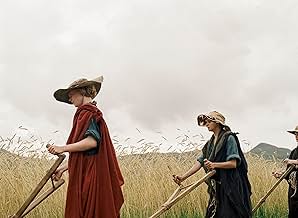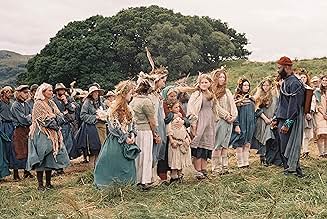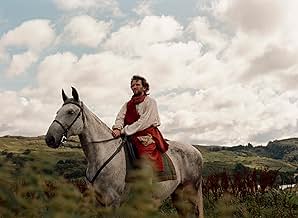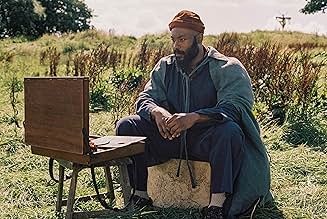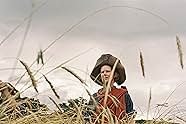Over seven hallucinatory days, a village with no name, in an undefined time and place, disappears.Over seven hallucinatory days, a village with no name, in an undefined time and place, disappears.Over seven hallucinatory days, a village with no name, in an undefined time and place, disappears.
- Director
- Writers
- Stars
- Awards
- 4 nominations total
- Director
- Writers
- All cast & crew
- Production, box office & more at IMDbPro
Featured reviews
Hmmm. As a Scotsman, I think this is one of those films that I'm supposed to like - it has a solid cast and an interesting concept underpinning it - but I ended up distinctly underwhelmed by the lacklustre feel of the whole thing. An agrarian, Scots, community awaken one morning to find that one of the barns of the laird "Kent" (Harry Melling) has been damaged by fire. As if that wasn't curious enough, there is also some smoke billowing from the opposite end of their village where some newcomers have settled for the night. Suspicions run riot, but before the people do likewise "Walt" (Caleb Landry Jones) attempts to see just what happened and two of the visitors end up in the stocks. Meantime, the villagers are also a little wary of "Quill" (Arinzé Kane) who not only dresses strangely but has been tasked by their boss with mapping out his estate to increase productivity. As the story unravels, we discern that "Kent" and "Walt" are old friends but that tragedy has impacted on both of their lives rendering them shadows of their former selves. Things come to an head when the enigmatic "Jordan" (Frank Dillane) arrives and claims ownership of the entire village and demands that everyone shift so he can rear more sheep. Where are they to go? Now some emphasis is made on the local and sometimes quite earthy dialect used here, but sadly the audio mixing is frankly rather poor and so half the time it's quite difficult to hear what dialogue there is - and that's not great for a drama that focuses substantially on characters and their conversations. As the actual plot itself slowly develops, we are presented with a series of mixed historical messages that contrive to make points that aren't really borne out by events or circumstances we can actually see, and as we move, lethargically, towards an inconclusive conclusion I found that not only was I confused, but I was also surprisingly disinterested by the whole affair. Neither CLJ nor Melling really impose themselves, though that's as much to do with their rather weak personas, and the internecine and superstitious behaviour of the population seemed a little too conveniently stereotypical of some things Scottish or English or British or even Brazilian! It does have a very authentic production design to it and effort has clearly gone into recreating a community run by a landed gentry - though, curiously, without any significant religious figure - who lived a completely different life from his serfs. I haven't read the book upon which this is based, but can guess that the politics behind the highland clearances might inspire somewhere here. Again, though, that aspect is as undercooked at the rest of this meandering effort. I've watched it twice now but feel I've got all I'm going to get from something that just feels incomplete and slightly frustrating.
Harvest: Set in Scotland during an undefined era, maybe late medieval but some anachronisms suggest a later period. Steeped in folklore and the heritage of rural life, Folk Horror also intrudes on this less than idyllic existence. A fire destroys a barn but the Harvest Feast goes ahead the next day, The estate owner has brought a cartographer to his lands, lands we learn that are no longer his but belong to a cousin. The cousin wants to enclose the commons, drive off the tenants and introduce sheep to the land. The map is not the territory but by drawing boundaries and giving names to previously unnamed features a new reality is created. Maks and costumes which would not be out of place in The Wicker Man are worn by the villagers, folk songs and dances are performed. Some of which hint at an adherence to old beliefs. The downfall of the villagers lies in their fear and mistrust of outsiders and their willingness to blame other ordinary people for their troubles rather than their oppressors. Witches are hunted and there are some violent scenes and deaths but the real horror lies in how a time of changes brings destruction to a traditional way of life. At 131 minutes it is overlong and would have benefitted from a 20 minute cut in it's running time. Directed by Athina Rachel Tsangari, Screenplay by Joslyn Barnes and Tsangari from the 2013 book by Jim Crace, 7.5/10.
In cinemas, streaming on MUBI from 8 August.
In cinemas, streaming on MUBI from 8 August.
Somewhere in Britain in what appears to be the seventeenth century, a small village finds that its way of life, pretty much unchanged for generations beyond count, is under threat from outsiders.
The first outsiders are two men and a woman who are accused of arson - even though the fire was almost certainly started by villagers under the influence of magic mushrooms. The second is a map-maker (beautifully played by Arinze Kene) brought in by the lord of the manor, Master Kent (Harry Melling) to chart the village with a view to increasing it's wealth through raising more sheep. Last there is Master Jordan (Frank Dillane, who's performance is both understated and wonderfully sinister). He's the cousin of Kent's late wife, and announces that he's now the legal owner of the village and intends to evict everyone to turn the place entirely over to sheep.
Also key to events is Walt (Caleb Landry Jones) an outsider who was Kent's boyhood friend who married a village girl (now deceased) and is simultaneously part of the village and not part.
Oddly for the seventeenth century, there is no priest or any other religious figure either in the community or amongst the outsiders.
Suspicion and paranoia erupt; a crime is committed (we never do find out who perpetrated it); neighbour turns against neighbour; Kent and Walt are revealed to be seriously lacking in backbone; and things end with a scene out of Fiddler on the Roof.
The cinematography is excellent and the landscape is a character in and of itself - but the film overall is a disappointment. The viewer is led to expect that there will be some sort of climax - presumably a bloody one - but the film just tails off into nothing.
The first outsiders are two men and a woman who are accused of arson - even though the fire was almost certainly started by villagers under the influence of magic mushrooms. The second is a map-maker (beautifully played by Arinze Kene) brought in by the lord of the manor, Master Kent (Harry Melling) to chart the village with a view to increasing it's wealth through raising more sheep. Last there is Master Jordan (Frank Dillane, who's performance is both understated and wonderfully sinister). He's the cousin of Kent's late wife, and announces that he's now the legal owner of the village and intends to evict everyone to turn the place entirely over to sheep.
Also key to events is Walt (Caleb Landry Jones) an outsider who was Kent's boyhood friend who married a village girl (now deceased) and is simultaneously part of the village and not part.
Oddly for the seventeenth century, there is no priest or any other religious figure either in the community or amongst the outsiders.
Suspicion and paranoia erupt; a crime is committed (we never do find out who perpetrated it); neighbour turns against neighbour; Kent and Walt are revealed to be seriously lacking in backbone; and things end with a scene out of Fiddler on the Roof.
The cinematography is excellent and the landscape is a character in and of itself - but the film overall is a disappointment. The viewer is led to expect that there will be some sort of climax - presumably a bloody one - but the film just tails off into nothing.
Harvest (2024), based on the novel with the same name by Jim Crace (2013), is a film directed by Athina Rachel Tsangari about a remote English village as economic progress disrupts their peaceful life following the "Inclosure acts". The opening shots introduce the protagonist, Walter Thirsk (played by Caleb Landry Jones), running through fields, playing with bugs and swimming in a lake, In other words, he's basking in nature and has some sort of spiritual moment (we later find out he was eating 'shrooms but it doesn't matter much to the plot).
Later we see a scene in a nearby village where people are trying to extinguish a fire, In this village we see the rest of the "action" (there's not much of it) in the movie. They have a master by the name of Kent (played by Harry Melling - Dudley Dursley in Harry Potter) who hires a chart maker, Phillip Earle, to map out the village. Walter (the main character) picks up an injury on his hand during the fire so he can't plough the land or help much with manual labour. Thus he becomes a de facto assistant to Phillip (the chart maker).
Oh, there's also some intruders to their land at one point, two men and a woman who cause a fight with the villagers. In a semi-comical way (probably intentional), the villagers hold the two men hostage and shave the woman's hair as punishment. The men stay as prisoners for about a week, while the woman runs away. The role of these characters, beside representing "the others" against which the villagers would (sort of) unite in a heavy-handed xenophobic way, doesn't amount to much. The rest of the story pans out in this simmering heat. I can't call it real tension because almost at no point in the movie did I really care about any of the characters. That could be my fault, but I surely wasn't helped along the way. If the director's intention was to portray a village that is on its way to disappear, she succeeded, just too early in the story for us to care.
Without spoiling much, some stuff happens later on, and if there's something that united the two main characters, Walter and Kent, it's their permanent disengagement with what is happening around them. It's a weird (and bold move) to tell a story through characters that are extremely passive, and it could work in theory, if the action around them is interesting enough, but it just painfully lacks any real tension.
I can't speak of the novel, as I haven't read it, but I did watch the film and here's how I would describe it in short: a confused tale about a village struggling for its existence with a main protagonist that just doesn't seem to care (and doesn't make us care either); all that is shot in a beautiful 16mm film that creates an eerie ambience that instead of providing clarity to the plot just muddies it even more.
Or if you prefer the official synopsis, "Over seven hallucinatory days, a village with no name, in an undefined time and place, disappears".
When it comes to aesthetics, it is undoubtedly a beautiful film. But as is often the case, the director falls in love with the form rather than the substance, and if in a novel that can work, film is a different medium and rarely does it satisfy audiences by self-indulging without giving anything substantial in return.
I can read and enjoy someone like Joyce or Proust obsess over textures, senses and feelings, but it's asking too much from the audience to create those descriptions in our heads out of beautiful shots in a film and at the same time remain engaged in the story, without providing at least some psychological nuance (if not action). The eeriness and dreamlike mood that it clearly goes for makes the film watchable, it's just not enough to keep me engaged in the characters and the plot itself. The confusion of the protagonist seeps through to the audience, and the story... well, we're never quite sure what to make of it.
Later we see a scene in a nearby village where people are trying to extinguish a fire, In this village we see the rest of the "action" (there's not much of it) in the movie. They have a master by the name of Kent (played by Harry Melling - Dudley Dursley in Harry Potter) who hires a chart maker, Phillip Earle, to map out the village. Walter (the main character) picks up an injury on his hand during the fire so he can't plough the land or help much with manual labour. Thus he becomes a de facto assistant to Phillip (the chart maker).
Oh, there's also some intruders to their land at one point, two men and a woman who cause a fight with the villagers. In a semi-comical way (probably intentional), the villagers hold the two men hostage and shave the woman's hair as punishment. The men stay as prisoners for about a week, while the woman runs away. The role of these characters, beside representing "the others" against which the villagers would (sort of) unite in a heavy-handed xenophobic way, doesn't amount to much. The rest of the story pans out in this simmering heat. I can't call it real tension because almost at no point in the movie did I really care about any of the characters. That could be my fault, but I surely wasn't helped along the way. If the director's intention was to portray a village that is on its way to disappear, she succeeded, just too early in the story for us to care.
Without spoiling much, some stuff happens later on, and if there's something that united the two main characters, Walter and Kent, it's their permanent disengagement with what is happening around them. It's a weird (and bold move) to tell a story through characters that are extremely passive, and it could work in theory, if the action around them is interesting enough, but it just painfully lacks any real tension.
I can't speak of the novel, as I haven't read it, but I did watch the film and here's how I would describe it in short: a confused tale about a village struggling for its existence with a main protagonist that just doesn't seem to care (and doesn't make us care either); all that is shot in a beautiful 16mm film that creates an eerie ambience that instead of providing clarity to the plot just muddies it even more.
Or if you prefer the official synopsis, "Over seven hallucinatory days, a village with no name, in an undefined time and place, disappears".
When it comes to aesthetics, it is undoubtedly a beautiful film. But as is often the case, the director falls in love with the form rather than the substance, and if in a novel that can work, film is a different medium and rarely does it satisfy audiences by self-indulging without giving anything substantial in return.
I can read and enjoy someone like Joyce or Proust obsess over textures, senses and feelings, but it's asking too much from the audience to create those descriptions in our heads out of beautiful shots in a film and at the same time remain engaged in the story, without providing at least some psychological nuance (if not action). The eeriness and dreamlike mood that it clearly goes for makes the film watchable, it's just not enough to keep me engaged in the characters and the plot itself. The confusion of the protagonist seeps through to the audience, and the story... well, we're never quite sure what to make of it.
I saw this film a while ago now, in the cinema. I did not write a review at the time but as I was just looking back at its IMDB page I thought I might as well since it has stayed with me ever since. It takes a fascinating point in history and manages to evoke the meaning of this great change taking place to a modern audience who can not really truly comprehend what came before. The idea of land unseparated and fenced apart is so far off now. And the cinematography and caleb landry jones' performance in particular portray the immaterial meaning of that. Harry Melling is also good and despicable.
Details
Box office
- Gross worldwide
- $99,029
- Runtime
- 2h 13m(133 min)
- Color
- Sound mix
- Aspect ratio
- 1.66 : 1
Contribute to this page
Suggest an edit or add missing content


